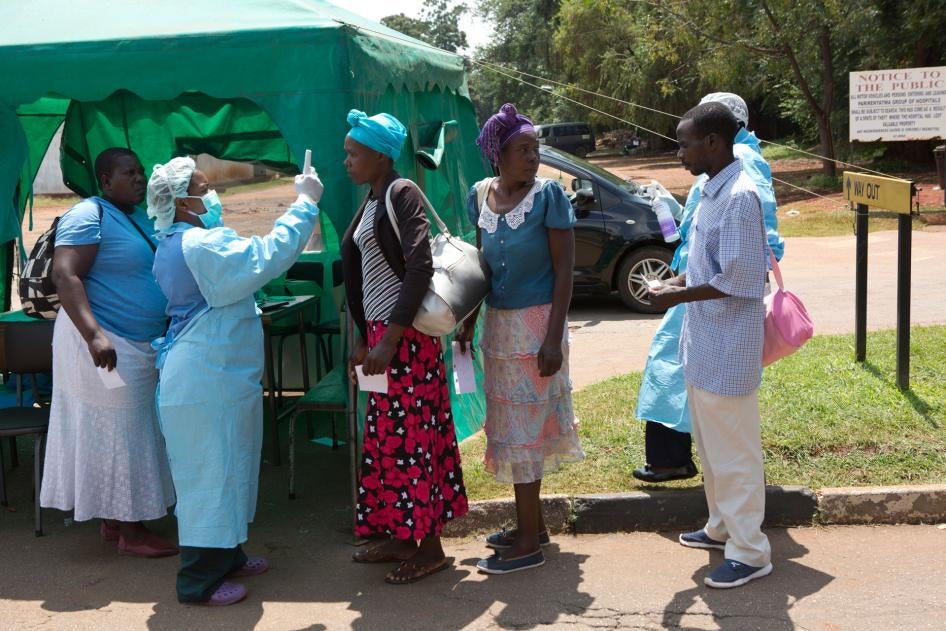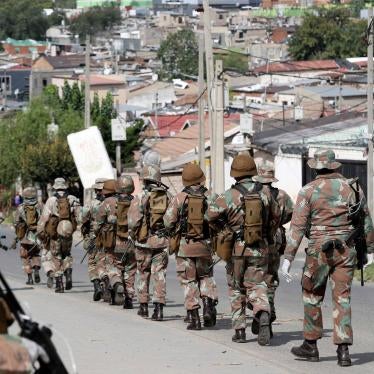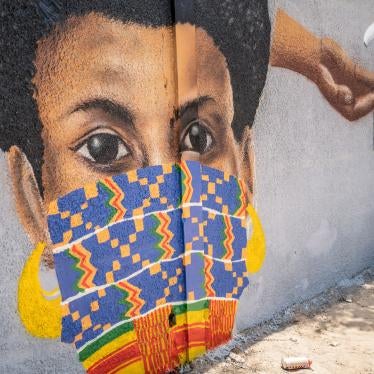The African Commission on Human and Peoples’ Rights has raised the alarm, calling on March 24 for governments to put human rights at the center of their fight against Covid-19. The crisis is rapidly spreading across Africa, with more than 15,000 cases reported.
As Africa intensifies the fight against the virus, there is an urgent need for people-centered interventions that carefully address human rights concerns. Mitigation measures and their integration with human rights vary widely. Several African countries have followed international trends by shutting their borders, imposing stay-at-home orders, and, in some cases, enforcing quarantines.
Governments should address the social and economic impact of lockdowns on low-income earners and the unemployed. Kenya announced tax relief and voluntary reduction of salaries of senior state officers. Nigeria is using an existing National Social Register to map and identify vulnerable groups for conditional financial help. The Rwandan government has announced a safety net, including through food distribution in Kigali, although details and any help that might be offered outside of the capital remain unclear.
International financial institutions have also taken steps. The World Bank has approved $12 billion in immediate support to reinforce poor countries’ efforts to respond. The African Development Bank raised an exceptional $3 billion bond to alleviate the economic and social impacts of Covid-19 on livelihoods. There are numerous campaigns by individuals and organizations in Africa and the African diaspora to support healthcare workers, and deliver meals and essential items to students and youth in informal settlements.
South Africa, with more testing than elsewhere on the continent, had 2,272 confirmed cases as of April 14, the highest recorded so far in Africa. The authorities have taken steps to limit and prevent the spread of Covid-19, including a 21-day nationwide lockdown by President Cyril Ramaphosa on March 23, which has been extended by two weeks. South Africa’s human settlements, water, and sanitation minister, Lindiwe Sisulu, announced that her department would increase the provision of water and sanitation measures in high-density public areas, informal settlements, and rural areas.
However, some responses, or a lack of response in some cases, have drawn severe condemnation. The Nigerian government’s failure to disclose key details of its cash transfer program has raised questions about the criteria for selecting beneficiaries. In the Democratic Republic of Congo, Kenya, and Uganda, security forces have used excessive and, in some cases, deadly force to enforce stay-at-home orders. In South Africa, heart-wrenching scenes of police and soldiers rounding up and herding homeless people into a stadium provoked a national outcry; security forces have killed at least nine people while enforcing the lockdown.
In Tanzania, President John Magufuli refused to close down churches on the grounds that the virus is “satanic and therefore cannot thrive in churches.” In Zimbabwe, a cabinet minister claimed that Covid-19 was not an African disease, but God punishing the West for imposing sanctions on Zimbabwe. Burundi’s government claimed that “the grace of God has protected Burundi” from Covid-19.
Such actions not only undermine African governments’ response to the pandemic, but also violate people’s rights to equal treatment, dignity, access to information, health care, and other necessities. This reduces trust in government institutions and messaging, the key ingredient for achieving compliance with government regulations.
The lessons learned from previous outbreaks of diseases such as Ebola are clear: when rights are blatantly abused, citizens have no incentive to respond to government appeals to change their behavior. Behavior change is one of the best ways of preventing the spread of infections, which in turn would ensure that already strained and inadequate healthcare systems are not overwhelmed. For this to work, trust between citizens and government is key.
In its March statement, the African Commission lays out critical measures that should be incorporated into national Covid-19 response strategies. They include the right to health, access to information, and temporary judicial measures to reduce the number of prisoners.
The commission called for solidarity among the private sector, community leaders, the media, and religious institutions. The private sector should use their socio-economic power, influence and resources to promote prevention and containment. The commission said traditional and religious leaders, the media, and opinion leaders have a responsibility “for shaping government action, promoting the prevention and containment measures, [and] providing relevant information and analysis to the public.” They should encourage the public to heed scientific advice.
Another critical stakeholder is the African diaspora. The African Union recognizes the diaspora as its sixth region with systems to enable diaspora bodies to participate in its structures and decision-making. Diaspora remittances dwarf official development assistance in many African countries such as Ghana, Kenya, and Uganda. During the West African Ebola outbreak of 2014, the African diaspora raised millions of dollars and sent thousands of volunteers to assist the AU Support to Ebola in West Africa, a special mission set up to coordinate the African response.
All these partnerships should be rooted in advancing human rights and endeavor to protect the rights of those at high risk of being harmed by the virus or its impact, such as the displaced, migrants, older people, sexual minorities, women and children. Governments should focus on community-based approaches to raise awareness, dispel myths, and increase resilience. Artists and social media activists could be enlisted to reach out to people. Some, like the leading Ugandan opposition politician and singer Bobi Wine, are already using song as a medium for his message.
This is the time for leaders to be ingenious and creative, and to draw lessons from previous efforts to deliver more holistic, rights-driven approaches. The Covid-19 outbreak should not be used as a basis to diminish rights, but an opportunity to reaffirm them. AU member states should heed the call of the African Commission and promote a comprehensive, people- and rights-centered response to Covid-19.
Carine Kaneza Nantulya is the Africa advocacy director and Dewa Mavhinga is the southern Africa director at Human Rights Watch.










